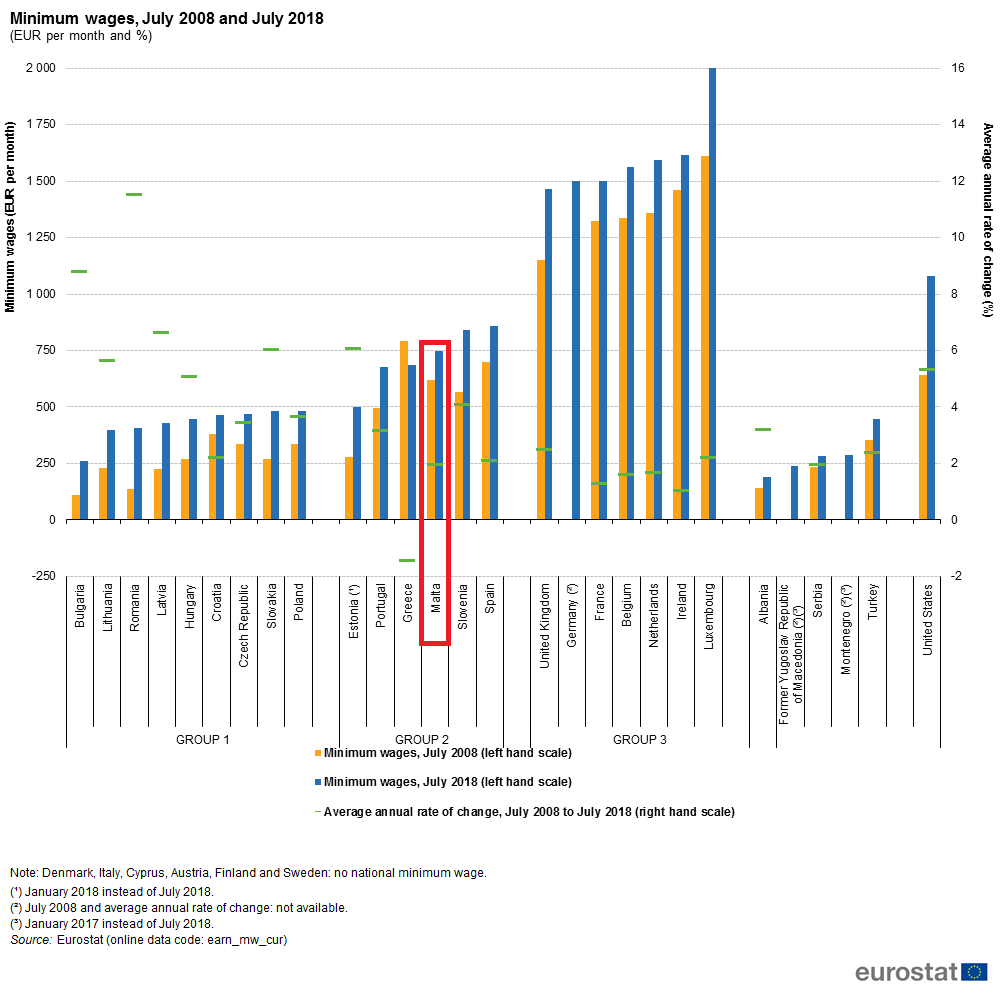
Reasons to increase the minimum wage are plenty. And some of them further prove that it is not only sensible, but also beneficial to higher income earners, who may not be morally bound to the principle of economic equity.
by Michael Grech
Photo: Pixabay
[dropcap]T[/dropcap]he wages in Malta are miserably low. Nothing speaks of this fact louder than the minimum wage—747.54 Euro per month. In April 27, 2017 Maltese government authorities announced that, by 2019, the minimum wage in Malta would increase by 8 Euro per week, or 400 Euro per year. This is the first increase to the minimum wage for the last 27 years that is not related to cost of living adjustment. From 1999 and until 2018, minimum wage in Malta was on average 625.15 Euro per month.
As established by the Caritas report of 2016, this amount is insufficient to lead most basic dignified existence. For years now, minimum wage does not achieve the purpose for which it was established in 1974: to guarantee a decent standard of living to a family of four.
In October 2016, a group of activists launched Paga Minima Diċenti—a campaign proposing the adequate minimum wage which would be adjusted to the cost of living. The sound social and economic arguments of the campaign are still valid. However, there are a few more reasons to add to further prove that an increase in the minimum wage is not only sensible, but also beneficial to higher income earners, who may not be morally bound to the principle of economic equity.
It therefore makes sense to increase the minimum wage…
Because Decent Minimum Wage Is Not about Ideology
Neoliberal politicians are quick to brand calls for sensible increases in wages as pertaining to the extreme left and radically socialist ideology. This alone is meant to undermine the demand and make it sound untrustworthy and thus, by definition, unreasonable, impractical and even dangerous.
[beautifulquote align=”left” cite=””]The idea of an adequate minimum wage used to be upheld by almost everyone across the political spectrum.[/beautifulquote]
This however is a lie. Up to a couple of decades’ years ago, before neoliberalism—itself an ideology—established itself as the new norm, the idea of an adequate minimum wage, sufficient to sustain a decent standard of living, used to be upheld by almost everyone across the political spectrum.
The idea that such a wage should enable one to sustain a family and even to adopt thrifty practices like saving could even be found in the (entirely anti-socialist) earliest Papal Social Encyclicals like Rearum Novarum and Quadragesimo Anno. Discussions encouraging conservatives to be more supportive of a minimum wage happened even on the pages of Forbes (!) So, whether you are a conservative, a liberal, or a socialist, you should at least accept that the idea of a mandatory sufficient minimum wage is not limited to any specific ideology.
![]()
Because It Will Improve the Quality of Public Services
One of the problems with the provision of services like public transport and waste collection in certain localities in Malta is the high turnover and, at times, shortage of employees. Workers come and go rapidly. Thus, the service-providing entities are either understaffed or tasks are manned by inexperienced novices rather than more seasoned employees and, inevitably, the quality of service suffers: fewer buses on the route or irregular waste collection.
[beautifulquote align=”left” cite=””]One of the major reasons for workers’ turnover is that the wage does not reward them sufficiently for their hard work and does not cover the cost of living.[/beautifulquote]
And one of the major reasons for this high turnover is that the wage does not reward workers sufficiently for their hard work and does not cover the cost of living. Let’s be honest: would anyone be willing to sweat for a miserly and inadequate pay? Tendering procedures could only exacerbate the problem: for instance, when the government or a local council seek to outsource running a service to a private contractor, they select the one who underbids on the costs, which too include labour costs.
An increase in low wages, therefore, may give these employees a greater incentive to stick to their jobs. And that means a better provision of services that you and I will enjoy. So, if you really want to live in a country where public transport is on time and streets are clean, you too should militate for an increase in wages.
![]()
Because It Is Good for the Health of Democracy (Yes, You’ve Read it Well)
The outcomes of the recent elections in the UK, USA and Italy angered many a Malta Independent-reader as well as liberal centrists and left-wing militants.
More than a few fuming commentators put the blame for dissolution of democracy squarely on ‘populism’, questioning whether the ordinary Joe or Jill should have the right to vote or not. Their argument is that ‘ignorance’ should implicitly disqualify individuals from having this right since, as the widespread misconception has it, the ‘uneducated’ will inevitably vote ‘the wrong way’ due to their supposed lack of knowledge. (The fact that it was primarily people with little formal education who fought fascism in the streets and on the barricades is something that the educated lot prefers to ignore).
[beautifulquote align=”left” cite=””]One reason why people may lack ‘political enlightenment’ is that not everyone has a luxury of dedicating time to thinking about society and politics.[/beautifulquote]
Voting may not simply reflect people’s choices. One reason why people may lack ‘political enlightenment’ is that most of their time is occupied by hard work which drains them physically and emotionally and leaves no space for acquiring a better insight into politics. Not everyone has a luxury of dedicating time to thinking about society and politics.

During the golden age of social democracy, intelligent and accessible reading, TV&radio shows and entertainment were popular among people across all social strata. Although the wages nominally increased since then, their value plummeted relatively to the cost of living, forcing people to work longer hours and, in some cases, to have more than one job. Of course, this slashed free time which could have been spent on reflecting on society in a meaningful way.
National broadcasting outlets do not dedicate much effort to promote social awareness. Mainstream TV channels are filled with reality shows, non-stop glamourous advertising, shoddy soaps and football championships, which, frankly, could appear more seductive than an educationally uplifting kind of entertainment. Reading an intelligent book or following a civic debate requires concentration. Had he to work 10 hours a day, even Aristotle would have opted for L’Esorciccio rather than Eisenstein.
So, if you wish people were more enlightened and, hence, less prone to ‘voting the wrong way’, the least thing you could do is to campaign for an increase in the lowest wages.
![]()
Because It Would Support the Rule of Law
Some people are, given their circumstances, unemployable. They will inevitably depend on welfare benefits which therefore should be adequate. Others, although able to find gainful employment, prefer to rely on welfare while supplementing their dole through illegal employment. Mainstream conservative media makes a lot of fuss about the latter, illogically assuming that all people on welfare are leaches and use it as a pretext to attack the very idea of welfare.
[beautifulquote align=”left” cite=””]Increasing the lowest wages will constitute an incentive to work profitably, legally and pay their share of tax.[/beautifulquote]
Low wages will not encourage people able to join the workforce to get off welfare and/or seek legal employment. But, on the other hand, increasing the lowest wages will constitute an incentive to work profitably, legally and pay their share of tax. Legal employment would also help maintain health and safety standards. So, if you consider yourself a champion of the rule of law, you too should demand a substantial increase in the lowest wages.

Leave a Reply